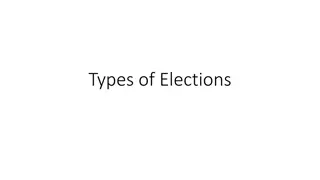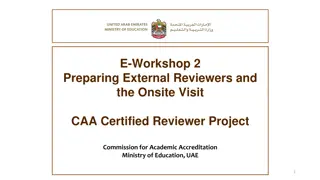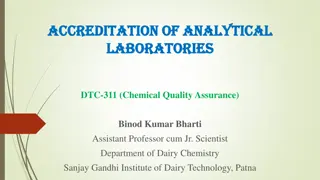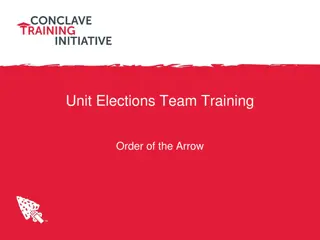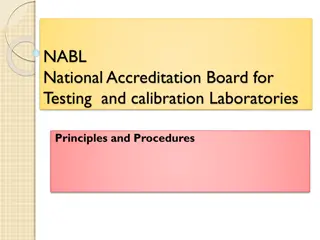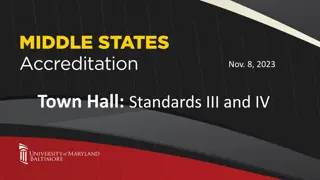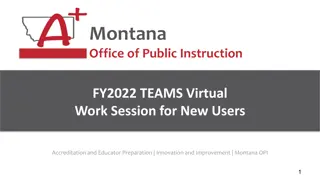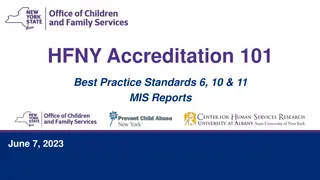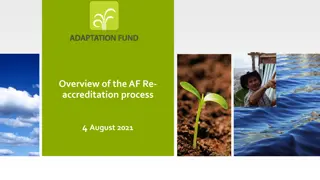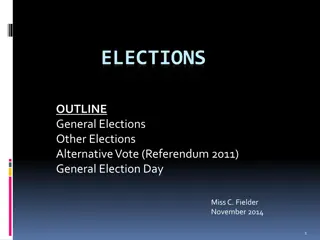Observing Local Government Elections: Roles, Responsibilities, and Accreditation
Learn about the crucial roles and responsibilities of election observers in promoting free and fair elections, including observing voting processes, counting votes, and ensuring transparency. Understand the accreditation process, identification requirements, and the importance of election observation in upholding democratic principles. Accreditation ensures that observers comply with the Electoral Commission's orders and contribute to building public confidence in electoral processes.
Uploaded on Jul 22, 2024 | 1 Views
Download Presentation

Please find below an Image/Link to download the presentation.
The content on the website is provided AS IS for your information and personal use only. It may not be sold, licensed, or shared on other websites without obtaining consent from the author. Download presentation by click this link. If you encounter any issues during the download, it is possible that the publisher has removed the file from their server.
E N D
Presentation Transcript
DDP ELECTION OBSERVERS 2021 LOCAL GOVERNMENT ELECTIONS ELANGENI HOTEL 30 APRIL
All observers must be accredited with the Electoral Commission. The Commission will accredit organisations wishing to appoint election observers in the interest of promoting free and fair elections. Any person appointed as an accredited observer must comply with orders issued by the following: The Commission Any electoral officer An employee of the Commission A member of the security services acting on the instruction of an officer. ACCREDITATION
ROLES AND RESPONSIBILITIES According to the United Nations, election observation is a valuable tool for improving the quality of elections, as: Observers help build public confidence in the honesty of electoral processes. Observation can help promote and protect the civil and political rights of participants in elections. It can lead to the correction of errors or weak practices, even while an election process is still under way. It can deter manipulation and fraud, or expose such problems if they do occur. When observers issue positive reports, it builds trust in the democratic process and enhances the legitimacy of the governments that emerge from elections.
CONTINUED Observers may do the following: Observe the voting process at voting stations Observe the counting of votes at a voting station Observe the final counting, determination and declaration of the final results by the Commission Present themselves during the viewing and sealing of empty ballot boxes before voting begins Address comments and questions to the presiding officer Leave and re-renter the voting station Take notes and write observations on all aspects of the voting and counting processes. Talk freely to the voters outside a voting station. Record election results after the counting has been completed at a counting station.
IDENTIFICATION Accredited observers will be issued with unique identification cards with their names and the organisations they represent. On entering a voting station, the presiding officer may ask for proof of identification in the form of a South African ID or passport to verify their identity. Election observers must, at all times, wear identification with the words Election Observer on the back and front of the identification apparel in black letters, at a height of at least 10 cm on a white background.
Regulations are in place to govern the accreditation of observers. This includes a Code of Conduct for Accredited Observers. In terms of the Regulations, the accreditation of an observer is valid for a year, but is conditional on the observance of the Code of Conduct. In terms of the Code of Conduct, every accredited observer must: observe the election impartially and independently of any registered party or candidate contesting the election; remain non-partisan and neutral; be competent and professional in observing the election; and provide the Commission with a comprehensive review of the elections, taking into account all relevant circumstances, including: CODE OF CONDUCT
The degree of impartiality shown by the Commission The degree of freedom of political parties to organise, move, assemble and express their views publicly The opportunity for political parties to have their agents observe all aspects of the electoral process The fairness of access for political parties to national media and other resources of the state The proper conduct of polling and the counting of votes Any other issue that concerns the essential freedom and fairness of the election. In terms of the Code of Conduct, observers may not: CONTINUED
disrupt and interfere with the voting process; touch the ballot papers or any other election material; exert influence on voters in any way; talk to voters inside a voting station; instruct, give orders or countermand decisions of any of the voting station officers; make objections or file complaints; observe how a voter has marked a ballot paper; support a candidate or any political party; accept gifts or favours from a political party, organisation or person involved in the election; express a view or opinion on any matter that is the subject of electoral campaigning; influence or attempt to influence the choice of a voter regarding any registered political party or candidate in an election; or wear, carry or display any political party s symbols or colours
TIPS FOR OBSERVERS It is important that observers familiarise themselves with the area in which they will be observing the elections. For instance, they would need to know the following: Which parties are the dominant political parties in the area Where the voting stations are The telephone number of the national and provincial electoral offices, as well as the emergency numbers for the emergency services Observers should also ensure that they: introduce themselves to the presiding officer or counting officer; do not interfere with the functions of the voting staff or security; are neutral and impartial;
CONTINUED respect the authority of the Electoral Commission; respect the secrecy of the ballot; bring a notebook and pens with them; keep a record of where they observed and what they observed; and make sure they have their identification apparel and letter of authority with them when visiting: - Voting stations - Counting stations - Result centres - Electoral Commission offices
The Presiding Officer The presiding officer is responsible for the efficient management of the voting process at a voting station. Presiding officers are hired by the Electoral Commission about six months before an election, and one is assigned to each voting station or district. The role of a presiding officer is to: coordinate and supervise the voting processes at the voting station to ensure that the election at the voting station is free and fair; ensure orderly conduct at the voting station; this includes ordering the removal of a person whose conduct is not conducive to a free and fair election: if such a person is informed of the reason for his or her removal, but still fails to leave the voting station, the presiding officer can order a member of the security forces to remove that person from the voting station; exclude from the voting station, if necessary, any person other than the following: Staff of the Electoral Commission Agents who are entitled to be there A ward candidate An accredited observer A voter for the purpose of voting The number of party candidates that can comfortably be accommodated in the voting station Anyone else authorised by the Electoral Commission
The Deputy Presiding Officer The deputy presiding officer assists the presiding officer with the management of the voting process at a voting station. He or she will also take over as presiding officer in the absence of the presiding officer. The Counting Officer The counting officer for a voting station coordinates and supervises the counting of votes and the determination of the result of the voting station to ensure that the election at that voting station is free and fair. The role of the counting officer mirrors, in many respects, that of the presiding officer, except that his or her role pertains to counting. The Deputy Counting Officer The deputy counting officer assists the counting officer with the management of the counting process at a voting station. He or she will also take over as counting officer in the absence of the counting officer.
Party agents Each political party participating in an election can appoint two agents to be present at a voting or counting venue. In some cities where there are many voters at a voting station, the Electoral Commission can set up different queues (called streams ) of voters at a voting station in different rooms of a bigger voting centre. Parties and independent candidates can then have agents for each stream. While party agents are important to ensure that the process is free and fair, it does not invalidate the proceedings if there are no party agents present at a voting station. Observers An observer is a neutral outsider who is present and sees what happens during voting, counting, and the determination and declaration of results, and can tell the world that the process was transparent, free and fair.
The Constitution of the Republic of South Africa is the supreme law of the country. It enshrines the rights of voters, establishes the Electoral Commission as one of the pillars of democracy, requires the establishment of a national common voters roll, prescribes the use of an electoral system based on proportional representation in all spheres of government, and provides the foundation for the election of members to the National Assembly, provincial legislatures and municipal councils. The government must follow the Constitution in the running of the country and cannot make any new laws that go against the provisions of the Constitution. Old or new laws or parts of laws can be challenged in court if they go against the Constitution. The Constitution creates the framework for the running of free, fair and regular elections as part of its founding provisions.
Chapter 1, Section 1: 1. Republic of South Africa The Republic of South Africa is one, sovereign, democratic state founded on the following values: (a) Human dignity, the achievement of equality and the advancement of human rights and freedoms (b) Non-racialism and non-sexism (c) Supremacy of the Constitution and the rule of law (d) Universal adult suffrage, a national common voters roll, regular elections and a multi-party system of democratic government to ensure accountability, responsiveness and openness It also includes all the civil and political rights relating to elections such as the freedom of the media and the right to vote.
The Bill of Rights, which forms part of the Constitution, lists the rights of all the people of South Africa and enshrines the democratic values of equality, human dignity and freedom. The Bill of Rights includes civil rights and freedoms that directly affect rights around elections, including the following: Freedom of conscience, religion, thought, belief and opinion (Section 15) Freedom of expression (Section 16), including: - freedom of the press and other media - freedom to receive or give out information or ideas Freedom of assembly, demonstration, pickets and protest (Section 17) Freedom of association (Section 1).
The Electoral Commission Act, Act No 51 of 1996, regulates the establishment of the Electoral Commission to manage national, provincial and municipal elections. It details the composition of the Commission, the creation of an administrative structure, and the powers, duties and functions of the Commission. The Electoral Act, Act No 73 of 1998, provides regulations regarding the operation of national, provincial and municipal elections. It is often described as the instruction manual for elections. The Electoral Commission is responsible for administering the terms of this Act, which include the registration of voters and the voters roll, the proclamation of and preparation for elections, the delineation of voting districts, voting stations and forms of voting material, the appointment of voting and counting officers and additional persons, the accreditation of observers, and the determination and declaration of final results. Several regulations and amendments have been published in terms of the Electoral Act.
The purpose of the Electoral Code of Conduct is to promote conditions that are conducive to free and fair elections, including the following: Tolerance of democratic political activity Free political campaigning and open public debate. Every registered party and every candidate bound by this Code must do the following: Promote the purpose of the Code when conducting an election Publicise the Code widely in any election campaigns Electoral Code of Conduct and electoral offences Promote and support efforts in terms of the Electoral Act to educate voters. Any political party that breaches the code can: be fined; be stopped from working in an area; or have their votes in an area cancelled. The Electoral Court has jurisdiction in respect of all electoral disputes and complaints about infringements of the Code of Conduct, subject to section 20(4) of the Electoral Commission Act. Electoral fraud refers to illegal interference with the process of an election through deliberate wrongdoing. Electoral fraud can take place prior to an election taking place and throughout the election period, both inside and outside voting stations. Electoral fraud is a crime in South Africa
If a political party or candidate has breached the Electoral Code of Conduct, the matter can be: reported to the Electoral Court; reported to the nearest branch of the South African Police Service (SAPS); or reported to the Electoral Commission through its municipal, provincial or national office. Reporting of offences It is an electoral offence to force anybody to: register to vote or not register to vote; vote or not vote in an election; support or not support a political party or candidate; vote or not vote for a political party or candidate; attend or not attend a political event or rally of a political party; or interfere with the fairness or independence of the Electoral Commission or any officer of the Electoral Commission.
No person may: prevent a political event or rally from being held if they do not have the authority to do so; damage or remove election posters, billboards or placards this is not allowed from the date that an election is proclaimed (announced until the election results have been given out by the Electoral Commission; use the voters roll or election materials for purposes other than the election; provide false information, such as an incorrect physical address, when registering as a voter; register to vote or vote using the name of another person (living or dead); register to vote in a voting district in which the person does not reside; vote in an election when one is not allowed to vote; vote in a voting station where one is not allowed to vote; vote more than once in an election;
pretend to be one of the following: - An official of the Electoral Commission - A representative of a registered political party - A candidate in an election - An accredited (qualified) observer - An accredited (qualified) voter education official; prevent someone from speaking to other voters; interfere with a voter s right to secrecy when he or she is voting; bribe or influence officials of the Electoral Commission while they are doing their duty; misinform the Electoral Commission when asked to provide a statement; publish false information about an election that may disrupt, prevent or influence the election results; publish false information that may create anger or fear and could change the election results; provide information about voting or the counting of votes unless authorised to do so; interfere with any voting material; make, produce or supply election material when a person is by law not allowed to do so; remove, hide or destroy election material when a person is by law not allowed to do so; prevent the Electoral Commission from performing its duties in running the election; or harm the honesty and dignity of the Electoral Commission.
I, the undersigned, hereby pledge (promise or vow) that: 1. I will serve as a non-partisan election observer or monitor in the forthcoming election period to observe and/or monitor the voter registration, candidate qualification, political party candidate selection, campaign activities, media coverage, voting or ballot counting and tabulation processes or in any other non-partisan monitoring capacity that I may agree to perform; I will not conduct any partisan activity to affect the choices that voters may make in this election and/or referendum, and I will respect the roles of impartial election authorities at all levels and at no time interfere unlawfully or inappropriately in the administration of the election and/or referendum; 2. I am neither a candidate nor activist for any candidate, political party, group, movement or other association that is seeking public office in the upcoming elections, nor am I an activist in support of or in opposition to any upcoming referendum, and I do not intend to become a candidate in this election nor to use any non-partisan election observation or monitoring organization as a basis for supporting my candidacy in any future election; 3. I will maintain strict non-partisanship, by remaining impartial in all activities concerning the election process, refraining from expressing publicly any preference for or against any candidate, political party, group, movement or other association seeking public office or in support for or opposition to a referendum initiative, and rejecting all favors offered or threats issued by any of the electoral contestants or their agents; 4. I will work in support of a genuine democratic election process, without regard to who wins or loses, putting aside my personal views about those seeking public office or issues presented in a referendum, in order to promote a democratic process, except when I exercise my right to cast a ballot in the secrecy of a polling booth; 5. I have no conflicts of interest and will refrain from having any, be they personal, political, economic or otherwise, that would hinder me from fulfilling my non-partisan election observation or monitoring activities impartially, accurately and in a timely manner; 6. I will respect and protect the integrity of the non-partisan election observation/monitoring organization, including by following this Code of Conduct, any written instructions (such as observation/monitoring protocols, directives and guidelines) and any verbal instructions from the organization s leadership;
7. or members of the public before the election observation/monitoring organization makes a statement, unless specifically instructed otherwise by the organization s leadership; 8. I will attend all required domestic election observation and monitoring training sessions; I will strive to become familiar with the election law and regulations and other relevant laws as directed in the trainings, and I will fully adhere to the methodologies employed by the organization and will act in all domestic election observation and monitoring activities to the best of my abilities; 9. I will report impartially, accurately (including positive as well as negative factors) and as timely as possible on all events that I observe in my capacity as a non-partisan election observer or monitor; and 10. I hereby vow that I have carefully read and fully understand the Code of Conduct for Non- partisan Election Observers and Monitors; I agree to promote its goals and principles and to comply with its requirements. I further vow to resign from my role as an election observer or monitor if I should develop any conflicts of interest that would hinder me from fulfilling impartially, accurately and in a timely manner my non-partisan election observation or monitoring activities or if I should violate the requirements of this Code of Conduct. I will refrain from making any personal comments about my observations to the news media
Signed at: On this Date: Full name: Identity no. Cell/Tel: Signature: Witness:
EVALUATION 1. WHAT SESSIONS DID YOU FIND MOST USEFUL? 2. WHICH SESSION WOULD YOU LIKE TO BE IMPROVED? 3. PLEASE RATE THE FACILITATION FROM 1 5. 1 BEING VERY POOR; 3 BEING JUST SATISFACTORY AND 5 BEING EXCELLENT 4. ANY ADDITIONAL COMMENTS



